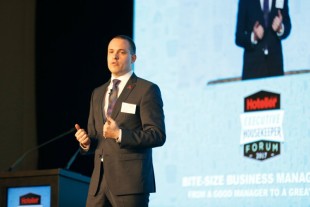

How to go from manager to leader in hospitality

In order to elevate one’s role from simply being a manager into being a great leader, five key qualities of emotional intelligence are vital, so narrated Marriott Marquis City Centre Doha executive housekeeper Jan Jeroen Hartog during the 2017 Hotelier Executive Housekeeper Forum held on May 3, 2017 at Grosvenor House, Dubai.
In his anecdote-filled presentation on leadership, entitled “From a Good Manager to a Great Leader”, Hartog enumerated the following qualities comprising emotional intelligence as vital for transforming oneself into a great leader: self awareness, self regulation, motivation, empathy and social skills.
With 'self awareness', Hartog talked about the importance of one’s ability in understanding and controlling one’s emotions, saying the need to ensure that whatever is happening outside of work should not affect one’s dealings with colleagues at work. He stressed how important it was for a leader to know his or her impact on staff and genuinely let staff know that a true leader cares about their welfare. With 'self regulation', he highlighted the importance of assessing and understanding the emotions of staff in order to properly decide how to respond. He added that self regulation should equip a leader properly on how to absorb what staff may be feeling or experiencing, process and deal with challenges.
'Motivation' factored in as the third quality needed for emotional intelligence, with Hartog highlighting the importance of knowing what drives one’s staff to succeed and what impacts their loyalty.
“All their hard work helps me. Ultimately, their results are my results,” he said.
'Empathy', the ability to put oneself in another’s shoes, was cited by Hartog as the fourth quality comprising emotional intelligence He narrated how as a leader, he would go the extra mile for his team, even citing an instance where he was fired over his decision to side with a team member over unfair treatment. Empathy is what provides his team with energy, Hartog said, and what drives them to deliver. Lastly, he mentioned having 'social skills' as vital to emotional intelligence, qualifying that effective communication was not simply about talking but more about listening and knowing when not to talk in order to understand staff, build relationships and lead from the heart.
Hartog added the vital importance of a leader’s ability to gain his or her staff’s trust. “You need to understand that everyone wants to be treated the way you want to be treated, the way your mom or your parents would want you to treat people.”
Addressing a question from an audience member, he also made an analogous comparison of a leader’s role to that of a parent, frequently striking a delicate balance between being a strict disciplinarian and a nurturer, saying that applying situational leadership is often necessary.
Ending on an appropriate note for a holder of a black belt in karate, Hartog concluded his presentation with a quote from the late martial arts star Bruce Lee: “Absorb what is useful; discard what is not; add what is uniquely your own.”